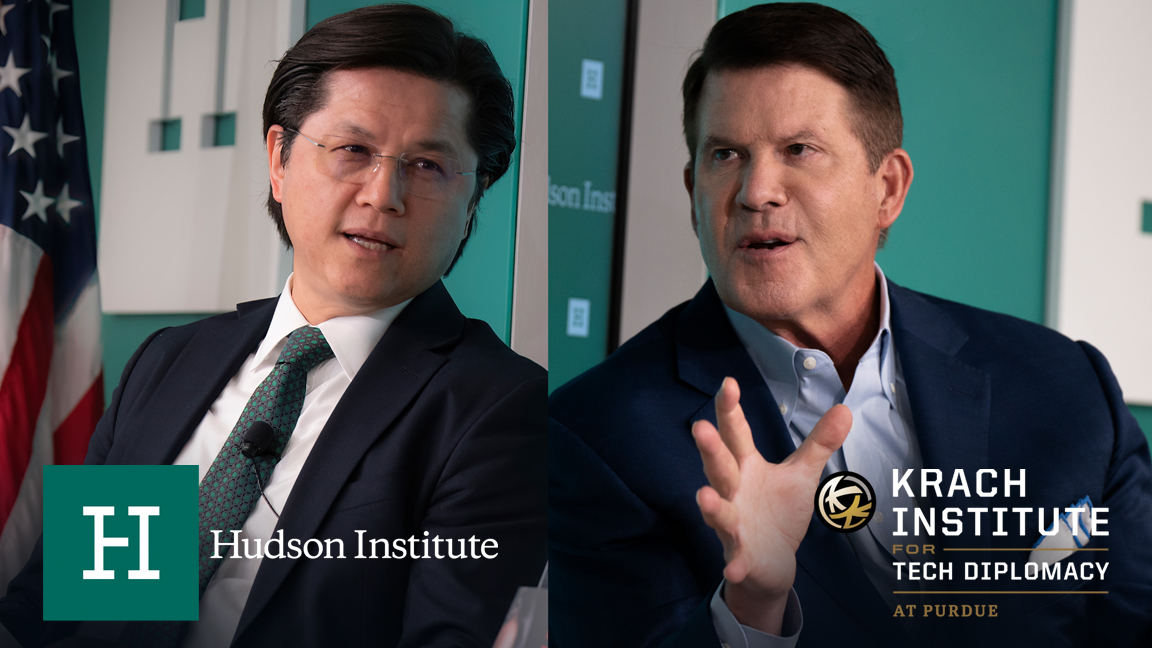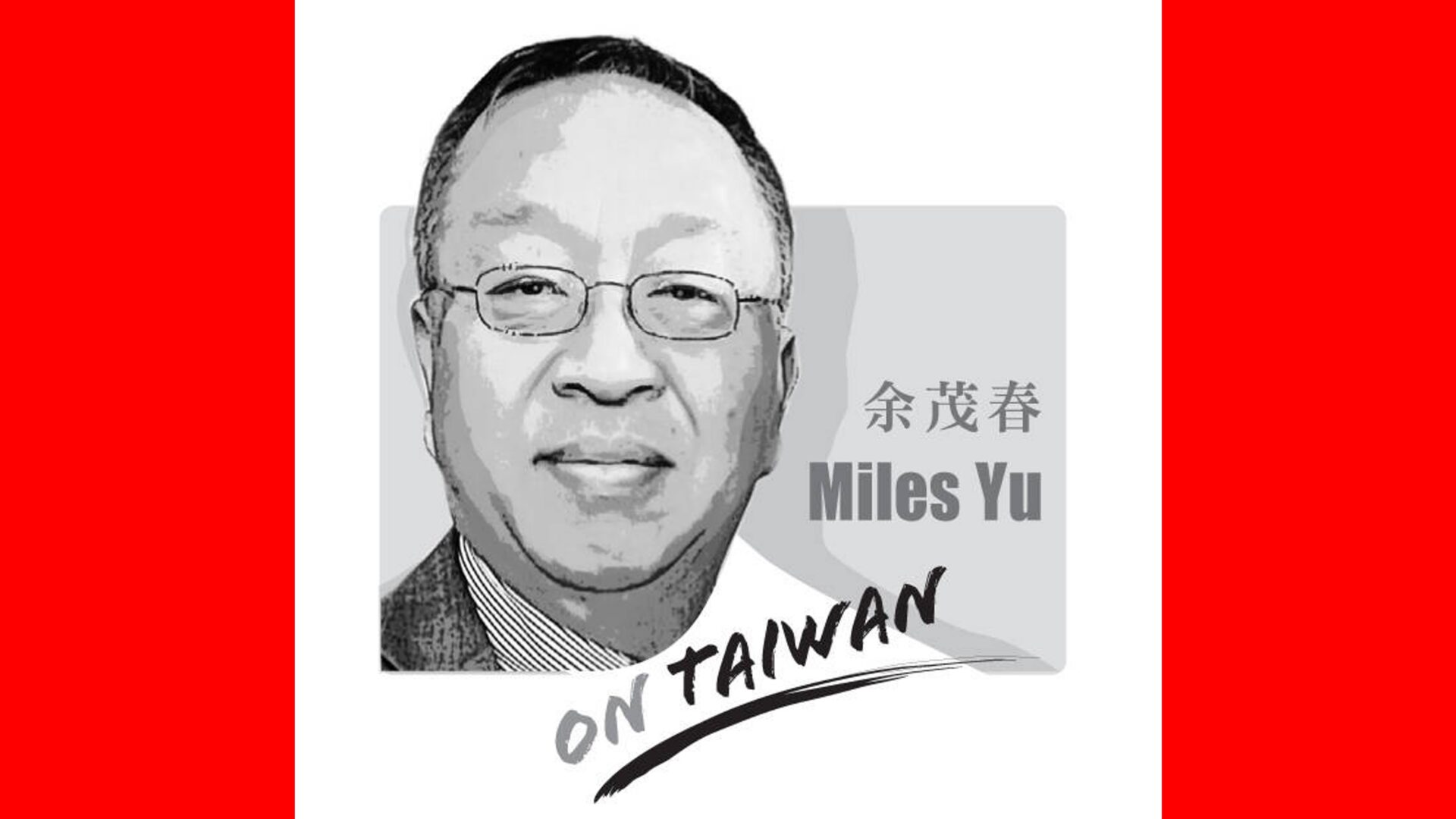
Hudson Institute Senior Fellow Nury Turkel and Global Tech Security Commission Co-Chair Keith Krach Deliver Briefing on Uyghur Genocide Divestment Movement
Krach Institute for Tech Diplomacy at Purdue
10.04.22WASHINGTON–On October 4, 2022, Hudson Institute Senior Fellow Nury Turkel joined former Under Secretary of State Keith Krach, chairman of the Krach Institute for Tech Diplomacy at Purdue, to discuss divestment from Chinese companies complicit in human rights abuses and the need to strengthen defenses against the Chinese high-tech companies that empower the Chinese Communist Party’s authoritarianism, which threatens freedom. The conversation was hosted by the Hudson Institute in partnership with the Krach Institute for Tech Diplomacy at Purdue.
“Keith is a prominent voice for those who have been subject to human rights abuses, and his calls to action have been described as groundbreaking by the Uyghur community. On the 4th of July 2020, on a national television broadcast, Keith was the first government official to openly label the CCP’s atrocities against the Uyghurs as ‘genocide,’ said Nury Turkel, author of No Escape, a powerful memoir that lays bare the Chinese government’s repression of the Uyghur people. “But Keith did not stop there. In addition to issuing the first business advisory, he compared the genocide in Xinjiang to the Holocaust, and called for divestment from Chinese companies complicit in human rights abuses. His letters to American CEOs, civil society leaders and university governing boards has spawned a divestment movement on college campuses.”
Turkel asked Krach about his latest Open Letter to the university governing boards in Inside Higher Ed. “The letter was to alert university boards that chances are that their endowment funds are invested in Chinese companies perpetuating the surveillance state which enable genocide and also reminding them that they have a moral obligation and fiduciary duty to divest from these stocks buried inside index funds,” answered Krach, Chairman Emeritus of Purdue’s Board of Trustees. “The Athenai Institute, a student-founded nonprofit comprised of College Republicans and Democrats, has responded to this call for divestment from malign Chinese companies by organizing a grassroots movement that is rapidly spreading across college campuses nationwide. They now have succeeded in creating a student movement on thirty college campuses that are pressing universities to step up and vote with their wallets.”
In an article supporting Krach’s 2022 Nobel Peace Prize nomination, young Athenai leaders stated: “He shed light on the continued exploitation of academic institutions by the Chinese Communist Party and its proxies and was the first public official to call upon the boards of private and public institutions to divest from companies complicit in the genocide of Uyghurs and other human rights atrocities committed by the CCP. In doing so, he helped lay the groundwork for the Uyghur genocide university divestment movement, a movement directly inspired by the successful student movement for divestment from Apartheid-era South Africa in the 1970s and 1980s.”
During the briefing, Turkel went on to tell Krach: “The tech companies you founded and led made life better for people, but as you know, dictators use technology to oppress people. Chinese companies like Huawei, Alibaba, Baidu, and Tencent are tools of the Chinese government’s surveillance state. One of your biggest achievements running U.S. economic diplomacy was creating the ‘Trust Doctrine’ and deploying it to build the Clean Network Alliance of Democracies, which defeated the CCP’s plan to export its surveillance operation beyond Xinjiang to the rest of the world.”
Krach noted that technology can be used for good or evil and the Institute for Tech Diplomacy at Purdue was founded on the belief that technology must advance freedom. He said that through its surveillance tools the CCP is “exporting a dictator out of a box” and American investors are unknowingly financing them through their pension funds. “These companies should be included in our capital market sanctions.” Turkel emphasized: “Not only is it unethical to invest in Chinese technology that poses national security threats. It’s unconscionable.” Krach replied, “I get asked by my fellow Silicon Valley CEOs when are Chinese companies on the Commerce Departments export controls list going on the Treasury Department’s capital markets sanctions OFAC list,” said Krach. “They should be. Consistency of policy is crucial.”
During the discussion, Turkel recalled that Taiwan’s de facto ambassador to Washington Bi-khim Hsiao dubbed Krach “Taiwan’s number one friend.” After his recent visit to Taiwan, Turkel said that “the concern about China’s military threats is palpable” and asked Krach about the possibility of an imminent Chinese invasion of Taiwan. Krach praised Turkel’s message that if China takes over Taiwan, the fate of the Taiwanese will echo that of the Uyghurs in Xinjiang. “Coming from you in particular, who grew up in a reeducation camp, I think that hit home,” said Krach. In assessing the gravity of the threat, Krach said, “The free world must stand with Taiwan—a linchpin of democracy and a role model of freedom.”
On the conflicting role of ESG (Environment, Social, Governance) investing in Chinese entities, Turkel pointed to a new Wharton Business School case study based on Krach’s “Clean Capital Markets Campaign” uses the solar industry which is deeply entangled in the Uyghur genocide, as a vivid example of how ESG investing in Chinese entities is inherently conflicted. Turkel said: “Investors, consumers, and voters want a ‘clean’ supply chain for clean energy, but the ESG investment industry has failed to deliver.” He then asked Krach if any Chinese solar companies that profit from slave labor should be included in ESG investments. “If you think about applying the standard with integrity, they all should be excluded for three reasons—E, S and G,” answered Krach. He explained: “E stands for environmental standards and they all use dirty unregulated coal in their energy intensive manufacturing process. S stands for ‘social responsibility’ and they all use Uyghur slave labor. G stands for good governance and there is no financial transparency, and it is impossible to audit their books.”
Turkel observed that Krach had been sought out by both sides of the aisle, which defies conventional wisdom in Washington, by highlighting Krach’s architecting of the CHIPS and Science Act, strengthening ties with Taiwan, securing the semiconductor supply chain, training diplomats on tech statecraft, and crafting strategies for China’s human rights abuses. “The Biden administration’s top Indo-Pacific affairs chief, Kurt Campbell, commented that almost all the work that Keith did at the State Department, including trusted networks, the Blue Dot initiative, etc., have been followed on in the current administration. It’s in many respects the highest tribute to your exemplary work.”
“As the great late Senator Vandenberg said, politics stops at the water’s edge and it certainly does in the Taiwan Strait,” said Krach. “When it comes to issues like combating China’s four-dimensional aggression, it’s absolutely critical. There is nothing that terrifies General Secretary Xi more than a united United States. And to our allies, continuity of policy is everything.”
Finally, Krach and Turkel discussed the Krach Institute for Tech Diplomacy at Purdue, where Turkel serves as a senior advisor, and the Global Tech Security Commission, established by the Krach Institute and the Atlantic Council to develop a Global Tech Security Strategy. Krach pointed to the institute’s mission of advancing freedom through trusted technology as an integral part of Purdue University’s focus on national security and foreshadowed the Global Tech Security Commission’s objective to deliver offensive and defensive strategies for combating techno-authoritarianism, as well as a plan to build a Global Tech Trust Network for adopting Tech Trust Standards to accelerate the use of trusted technology.
The full video of the Krach-Turkel briefing can be found here.
ABOUT THE KRACH INSTITUTE FOR TECH DIPLOMACY AT PURDUE:
The nonpartisan Krach Institute for Tech Diplomacy at Purdue is committed to the mission of advancing freedom through trusted technologies and democratic principles. The Krach Institute leverages Purdue’s leadership in innovative research, commercialization, STEM education, corporate partnerships, and national security to advance the field of tech diplomacy and tech statecraft. It is the world’s preeminent institution focused on tech statecraft, a new model of diplomacy that integrates high-tech strategies and foreign policy tools with the aim of rallying allies, leveraging private sector, and amplifying democratic values based on trust.
For more information, visit www.techdiplomacy.org and follow the Krach Institute for Tech Diplomacy at Purdue on Twitter, LinkedIn, and YouTube.
Related Posts

article
The Era Of ‘Tech Diplomacy’ Is Here
Technology is the new frontier of international relations. The interaction is bi-directional: technology is defining diplomatic matters while diplomacy is also influencing the development and deployment of technology. Take semiconductors as an example. This is a technology that forms the foundation of digital economy, national security, and productivity in almost all industries. Global supply chain in the semiconductor industry is shaping U.S. foreign policy. Conversely, America’s diplomatic effort has been redefining the supply chain. Tech diplomacy is different from science diplomacy, which became a key pillar for the U.S. and other countries since World War II. Scientists participated in treaty negotiations, engaged in bilateral summits and served as attachés at embassies. Primary topics included nuclear proliferation, super-collider construction, human space exploration and environmental science.

By: Miles Yu
article
Miles Yu On Taiwan: China’s lessons—and fears—from the Wagner revolt in Russia
For over a century, tumultuous events thousands of miles away in Russia have impacted China profoundly. Mao Zedong (毛澤東) famously said that the cannon sound of the October Revolution brought Marxism-Leninism to China. Now Xi Jinping (習近平) fears that last month’s Wagner revolt may provide a model for the Chinese Communist Party’s undoing.